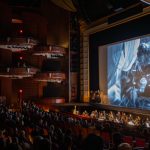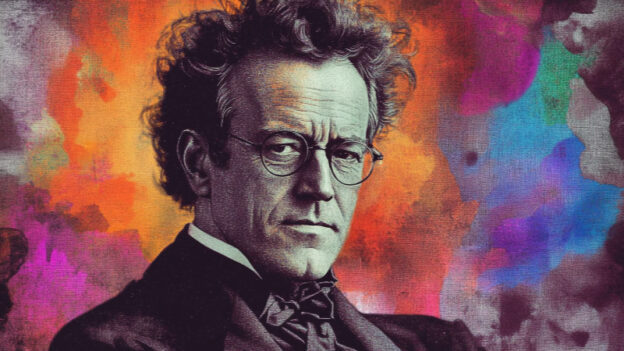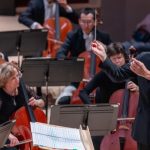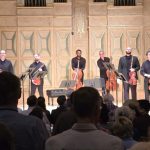June 5 & 7, 2025
Atlanta Symphony Hall, Woodruff Arts Center
Atlanta, Georgia – USA
Atlanta Symphony Orchestra; Peter Oundjian, conductor; Inon Barnatan, piano; Michael Tiscione, trumpet.
Dmitri SHOSTAKOVICH: Concerto No. 1 for Piano, Trumpet, and Strings, Op. 35 (1933)
Gustav MAHLER: Symphony No. 7 in E minor(“Song of the Night”) (1904-1905)
Mark Gresham | 8 JUN 2025
In a season finale befitting its stature, the Atlanta Symphony Orchestra closed its 2024–25 subscription series June 5 and 7 at Symphony Hall under guest conductor Peter Oundjian, delivering a program that juxtaposed Shostakovich’s sardonic brilliance with the vastness of Mahler’s Symphony No. 7. It was a lengthy concert. Given the Seventh Symphony’s total 77-minute duration, it could have stood alone as the entire program without intermission. But we got a much better, more delightfully engaging concert with the inclusion of Shostakovich.
From the first notes of the evening’s opening work, Dmitri Shostakovich’s Concerto No. 1 for Piano, Trumpet, and Strings, Op. 35, the ensemble displayed characteristic agility and humor. Pianist Inon Barnatan, a favorite of Atlanta audiences, dazzled with virtuosic clarity, weaving through the concerto’s rapid-fire keyboard passages with both precision and playful inflection. His timing and tone complemented the understated wit inherent to Shostakovich’s score. Michael Tiscione, acting principal/associate principal trumpet of the ASO, matched Barnatan’s flair in trademark trumpet flourishes, their interaction filled with exuberant energy. The string orchestra held taut, supplying tight-knit accompaniment amidst the concerto’s relentless punch lines. The performance captured the composer’s intended “snarky and rapid-fire” character.
Despite its modest forces and roughly 20-minute runtime, Shostakovich’s Concerto No. 1 feels larger than life. Written when the composer was just 26, the piece brims with mischievous subversion, blurring the boundaries between concerto and satire, vaudeville and virtuosity. The second movement’s lyrical depth offered a surprising wellspring of sincerity amid the surrounding irreverence, with Barnatan giving its broad, singing lines a fluid, almost vocal quality. Meanwhile, the finale erupted in full ironic display, quoting Beethoven’s “Rage Over a Lost Penny” amongst other pieces and tossing musical jokes like confetti. Oundjian wisely kept textures lean, allowing the soloists’ interplay to remain central and avoiding the temptation to overplay its theatricality.
After intermission came Mahler’s towering Symphony No. 7, subtitled “Song of the Night.” Oundjian marshaled a large orchestra with structural authority and tonal energy that had more edge than anticipated. The opening movement folded darkness and drama into a brooding tapestry. The three inner movements—the “Nachtmusiken” framing the “Scherzo”—were painted in distinct chiaroscuro. With its rapid rhythms and stark contrasts, the “Scherzo” movement in the center spun into eerie carnival energy before subsiding. The “Rondo-Finale” thundered with rhythmic propulsion, brilliant brass, and percussion leading to a raucous, celebratory conclusion where the final fanfares landed with splash and radiance: a night made day. Musically, they felt less like triumph and more as exultation earned. Oundjian paced it with urgent momentum yet refrained from overwhelming the long-range structure—a hallmark of effective Mahler interpretation.
Atlanta’s choice of Mahler’s Seventh as its season curtain call aligns with a broader pattern: several major Southern orchestras ended their 2024–25 seasons with a Mahler symphony. Among them are Houston (No. 3), Dallas (No. 2), and Nashville (No. 8). But of all Mahler symphonies, the Seventh is often overlooked due to its scale and complexity. Yet as one of the least performed of his symphonies, it leaves a lasting impression due to its eerie thematic depth.
Season finales are often about spectacle. Here, Oundjian and the ASO achieved both spectacle and introspection, delivering a performance that held true to the Seventh’s paradoxes: profound and playful, obscure and illuminating. It was an evening that reminded audiences why this Mahler symphony—despite its comparative rarity—is a vital part of the repertoire. ■
EXTERNAL LINKS:
- Atlanta Symphony Orchestra: aso.org
- Peter Oundjian: peteroundjian.com
- Inon Barnatan: inonbarnatan.com
- Michael Tiscione: aso.org/artists/detail/michael-tiscione

Read more by Mark Gresham.
RECENT POSTS
 The Atlanta Opera conjures a night of enchantment as Glass’ score reawakens Cocteau’s ‘La Belle et la Bête’ • 20 Nov 2025
The Atlanta Opera conjures a night of enchantment as Glass’ score reawakens Cocteau’s ‘La Belle et la Bête’ • 20 Nov 2025 Jan Lisiecki on discipline, performance psychology, and programming for his Spivey Hall recital • 17 Nov 2025
Jan Lisiecki on discipline, performance psychology, and programming for his Spivey Hall recital • 17 Nov 2025




.png)